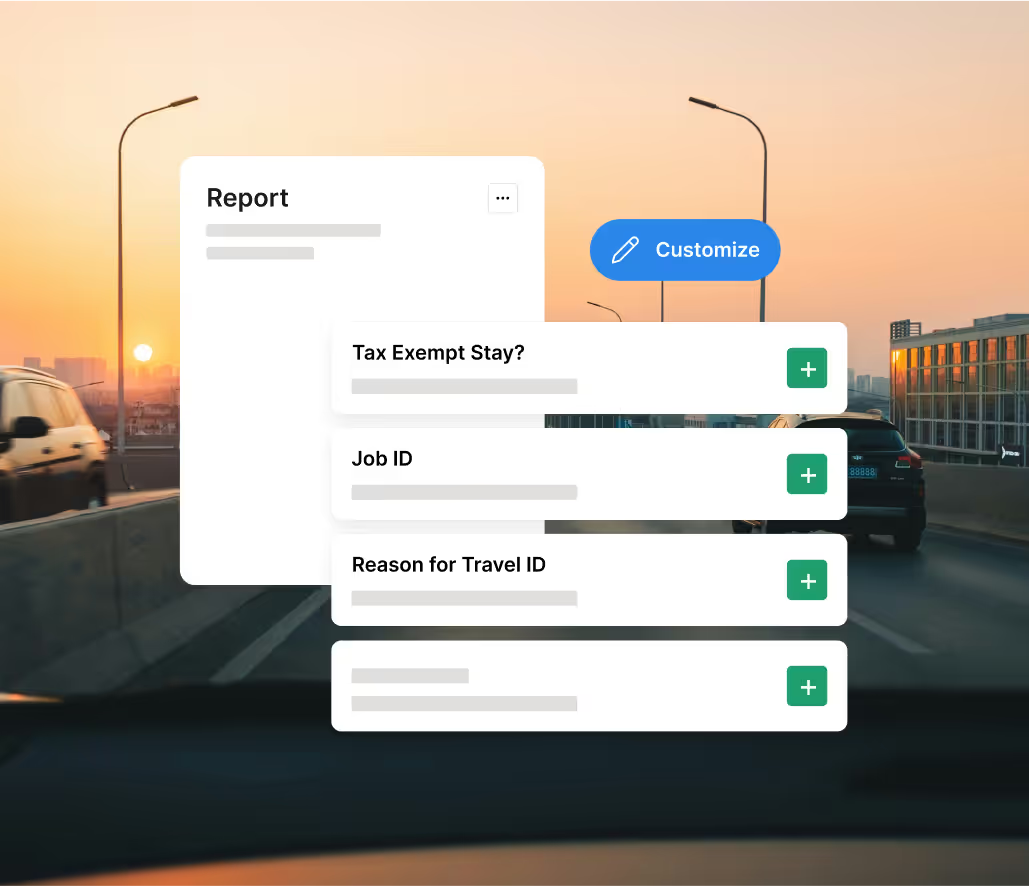Hotels vs Motels: The Operations Manager's Guide to Crew Accommodations

You're booking 15 rooms for next week's project. Half the crew calls asking where they're staying. The other half shows up to find out the motel is 45 minutes from the job site.
Most booking platforms are built for solo business travelers, not operations managers coordinating crews. A $60 motel versus a $180 hotel matters a lot when booking dozens at a time.
Engine's crew travel management platform eliminates this headache entirely. One click books your whole crew, tags each room to a job code, and sends you one monthly invoice. With booking taken care of, you can focus on deciding the best type of accommodation for your team.
The Real Difference Between Hotels and Motels for Crew Work
Your crew finishes a 12-hour shift covered in dust and wants a shower, not a bellhop.
Hotels give you buildings with interior corridors, elevators, and lobbies full of extras you don't need. Restaurant, gym, meeting rooms, and business center. Great when you're courting a client. Expensive when you're housing twenty welders.
Motels offer ground-level doors that open straight to the parking lot. Free surface parking. Maybe a vending machine and basic Wi-Fi. Built for crews who need beds and trucks parked where they can see them.
Extended-stay properties handle smaller teams on multi-week projects. Often family-run, they’re handy for remote jobs where the only other option is an hour's drive.
Five Critical Differences for Field Teams
Ground-Level Access vs. Elevator Rides
Your crew doesn't want to drag toolboxes through a lobby and up an elevator after a ten-hour shift.
Hotels force this with multi-story buildings and interior corridors built for tourists. Motels flip that script: single or two-story buildings, exterior doors, and parking ten feet from the bed.
Parking That Actually Works
Field teams travel with pickups, trailers, sometimes flatbeds. Motels stick to wide, free surface lots built for work trucks. You back in, lock up, and keep an eye on gear from the room window.
Amenities: Essential vs. Expensive
Hotels advertise pools, spas, room service, and concierge desks. Your welders care more about a hot shower and a microwave.
Motels keep it simple: bed, bathroom, Wi-Fi, maybe grab-and-go breakfast. Stripping the extras cuts nightly rates almost in half.
Location Strategy
Hotels gravitate to downtown cores, airports, and conference districts. Great for client dinners, lousy for 6 a.m. drives to an industrial park.
Motels line highway corridors and suburban edges where construction, logistics, and energy projects actually happen.
Technology That Works When You Need It
Your office still needs Wi-Fi even when the office is a roadside inn. Hotels typically invest in enterprise-grade internet because corporate travelers demand it. Motels can be hit or miss: fine for email, sketchy for video calls.
When Motels Make Sense for Your Crew
You book a motel when the job needs beds, parking, and predictability, not a lobby that impresses nobody.
Motels typically run $50–$100 nightly versus $150+ for mid-tier hotels, with transparent pricing that doesn't spike during local events.
Prime motel situations:
- Road and bridge work where crews leapfrog down highway corridors
- Plant shutdowns where long days and tight budgets make motels the obvious pick
- Utility repairs where line crews chasing storm damage need rooms the same night
- Oil and gas sites where remote locations rarely have full-service hotels nearby
- Installation teams on multi-city runs where schedule changes require flexible cancellations
Consider the trade-offs: motels lack polish for client meetings, have limited amenities for extended stays, and may not accommodate very large crews in one property.
When budget, logistics, and location align, motels deliver predictable costs and operational simplicity.
When Hotels Justify Their Premium
Price tells only half the story. Hotels deliver value when specific project needs outweigh their higher costs.
Choose hotels when:
- Client impressions matter—Polished lobbies project professionalism during client interactions
- Downtown projects—Five-minute walks to job sites versus long commutes from highway motels
- Extended stays—Multi-month projects benefit from kitchenettes, laundry, and stable crew comfort
- Large teams—Book 20+ rooms in one property rather than splitting crews across multiple motels
- Technical requirements—Need reliable internet, meeting spaces, or proper workspaces
Hotels do have drawbacks: double the rates of motels, problematic parking for trucks and equipment, and dynamic pricing that spikes during events.
If your project demands the amenities, Engine's centralized booking locks in group blocks early, negotiates parking, and handles the administrative complexity.

The Real Cost of Hotels vs Motels
The sticker price on the booking site isn't the bill that lands on your desk.
Base rates, apples to apples: Motels average $75–$120 per night while budget hotels start around $120 and climb to $200+ before fees.
That difference feels minor when booking one room. Multiply it by a 25-person crew staying 30 nights and the extra $75 per room becomes $56,250 coming straight out of your project budget.
Hidden fees show up at checkout. Hotels tack on parking, resort, and "facility" charges that don't appear until you're signing. Motels rarely charge for parking, and the exterior layout means your trucks sit right outside: no valet slip, no add-on fee.
Rate changes versus flat pricing. Properties use algorithms that spike rates when concerts, conventions, or playoff games hit town. Motels run simpler, flatter pricing that changes slowly.
Before locking in monthly stays, check current GSA per diem rates so finance signs off on the lodging line.
How to Keep Costs Predictable
- Book early—Even motels raise rates once occupancy rises
- Negotiate weekly blocks—Motels are used to long-stay trades and will cut rates for guaranteed occupancy
- Track everything in one place—Engine's platform pulls every room under one invoice and tags it to project codes
- Cap the extras—If premium accommodations are non-negotiable, at least negotiate parking and Wi-Fi fees upfront
Motels win on raw dollars and predictability. Premium properties justify their cost only when the project genuinely needs their extras.
The Booking Problem
The real issue isn't just finding properties – it's booking them efficiently. Try reserving 20 rooms on standard platforms and you'll spend hours managing email chains because each property responds at its own pace.
Engine's crew booking platform fixes this by pulling live rates, letting you book the whole block in one shot, tag it to a job code, and move on. One contract, one invoice, no weekend spreadsheet work.

Decision Framework: Hotels vs Motels
Pick the right property based on three factors: project duration, crew composition, and budget constraints.
Key Decision Factors
Budget Reality:
- Motels: $50–$100 per night with predictable pricing
- Hotels: Starting at $120, often exceeding $250 with added fees
- Red flag: Any property consistently above $150/night when cost control matters
Crew Needs Assessment:
- Construction/maintenance teams → Motels (ground-level access, truck parking)
- Client-facing personnel → Hotels (professional atmosphere, meeting spaces)
- Mixed teams → Split bookings by function (field crews in motels, management nearby)
Location Strategy:
- Industrial/highway projects → Motels (proximity to work sites)
- Urban/downtown jobs → Hotels (walking distance to sites)
- Commute impact → 30 minutes saved daily often outweighs amenities
When to Choose Each Option
Hotels make sense when:
- Client impressions matter
- Teams exceed 40 people
- Projects last 2+ months
- Technical work requires reliable connectivity
Motels are optimal when:
- Budgets are fixed
- Equipment/vehicles need accessible parking
- Schedules might change (flexible cancellation)
- Teams work in shifts or remote locations
Remember: happy crews, secure equipment, and predictable invoices drive project success.
Stop Fighting Booking Logistics
Successful projects depend on matching the right accommodations to your crew's needs. The key insight? Property selection is only half the battle—booking logistics create the biggest headaches.
Standard booking platforms turn group reservations into administrative chaos. You spend hours chasing confirmations, managing credit cards, and tracking receipts across multiple properties.
Engine eliminates these problems by centralizing everything: live inventory, standardized terms, project-coded bookings, and consolidated invoicing. No spreadsheets, no chasing confirmations, no surprise charges.
Ready to put your crew logistics on autopilot? Sign up for Engine today and focus on the actual work instead of receipt management.


.avif)

.jpg)

.jpg)




.jpg)




.avif)





![What is an OBT? [+ Why They Matter]](https://cdn.prod.website-files.com/66a41388b1be9ba182f1e80c/66f97c4190ac5e26bea90c05_66a41388b1be9ba182f1efc0_online-booking-tool.avif)










.jpg)


.jpg)




.jpg)








